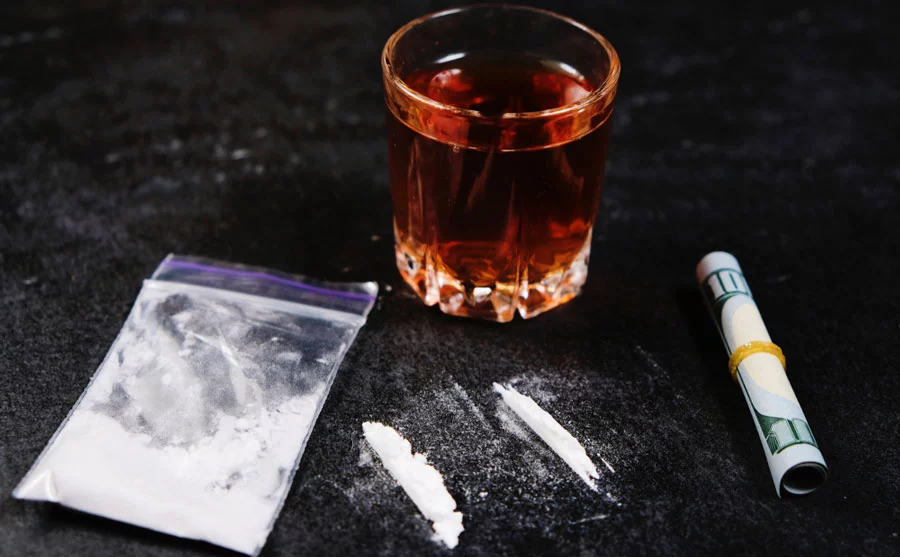The Real Dangers of Mixing Cocaine and Alcohol
Statistics indicate that alcohol use disorder and alcohol-related deaths have become more prevalent over the years – especially with the increase in substance use that has occurred since the start of the coronavirus pandemic. Similarly, drug overdose deaths in the United States involving cocaine rose from 5,419 per year in 2014 to 19,447 in 2020.
Some people mistakenly believe that mixing cocaine and alcohol together can help you avoid withdrawal. Others do it to increase the effects of one or both drugs. That said, the alcohol-cocaine combination is even more deadly than either drug on its own. Mixing cocaine and alcohol is also one of the most common ways people combine two different substances.
If you are someone who consumes both cocaine and alcohol, you deserve to know the risks and get the help you need. In this article, we’ll cover the independent effects of cocaine and alcohol use, what happens when you use cocaine and alcohol together, and how to find help.
Keep reading to find out more about mixing cocaine and alcohol, and the effective programs for recovery available at Best Rehabs In Arizona in Arizona and Colorado.
Effects Of Cocaine And Alcohol Use

Cocaine and alcohol are both toxic substances that can lead to extensive adverse reactions. However, the two drugs have very different effects on the body. Cocaine has stimulant effects, whereas alcohol is a depressant or “downer.” Before we discuss the toxic effects of mixing cocaine and alcohol together, let’s talk about the effects that can occur with the independent use of each substance.
Cocaine
Most people who engage in cocaine use do so to chase the euphoric effects. Again, cocaine is a central nervous system stimulant and toxic substance that places intense pressure on organs, leading to a serious risk of heart-related health issues such as heart attack and high blood pressure.
When you use cocaine, you may experience the following:
- Increased energy
- Low appetite
- A rise in body temperature
- Increased heart rate and blood pressure
- Insomnia
- Impulsive and risky behavior
- Anxiety, paranoia, and/or panic attacks
- Shaking or restlessness
- Irritability
- Aggression
- Dilated pupils
- Changes in mood
- Nosebleeds
- Nausea
Complications of cocaine use include but aren’t limited to heart, lung, and liver damage, as well as overdose, coma, seizures, and death.
Alcohol
When you consume alcohol, the central nervous system slows down, affecting how the brain communicates with the body. Alcohol can lead to a range of negative effects, especially if you binge drink or combine it with other drugs.
Potential effects of alcohol include:
- Dehydration
- Depressed breathing
- Impaired thinking and judgment
- Slowed reaction time and reflexes
- Choking (due to reduced gag reflex)
- Loss of motor function and coordination
- Pale or bluish skin
- Memory loss or blackouts
- Slowed speech
- Depression
- Anxiety
- Irritability
- Changes in mood
- Confusion
- Nausea
- Vomiting
Other side effects and risks associated with heavy drinking include but aren’t limited to liver damage, alcohol poisoning, overdose, death, coma, and seizures. Damage to other organs, including the heart and lungs, can also occur.
What Happens When You Mix Cocaine And Alcohol?

Mixing two substances together almost always means you face additional risks, but what about alcohol and cocaine specifically? First and foremost, when mixing cocaine and alcohol, the aforementioned effects of both cocaine and alcohol are heightened.
Combined use of cocaine and alcohol is associated with considerable damage to the body, some of which can be permanent. Risks such as overdose and death, as well as chronic health issues, become substantially higher. Cocaethylene toxicity explains some of these effects.
What is cocaethylene?
When alcohol and cocaine are consumed together, cocaethylene develops in the liver. Cocaethylene has a plasma half-life that is 3-5x the half-life of cocaine and is linked to liver damage, seizures, and compromised immune function. When compared to cocaine alone, cocaethylene carries an 18–25 fold increase in the risk of sudden death.
Other consequences of combining cocaine with alcohol include:
Higher risk of heart problems and stroke
Even alone, cocaine and alcohol abuse show an increased risk of sudden death, heart attack, and stroke. Mixing cocaine and alcohol together leads to an increase in effects on the cardiovascular system.
Higher risk of suicide
Studies show that those who use both cocaine and alcohol together are at a significantly increased risk of suicide. For example, one study conducted at Brown University found that those who engaged in simultaneous cocaine and alcohol use faced a risk of suicide 2.4x greater than those who didn’t.
However, this is just one of many studies that show the increased risk of suicide: mixing these two drugs together is shown to increase suicide risk time and time again in a variety of research articles. This risk should be acknowledged and taken seriously.
Increased alcohol consumption

50-90% of cocaine users are said to experience alcohol dependence as well. Researchers suggest that taking cocaine and alcohol together is associated with increased alcohol consumption.
Increased impulsivity
While cocaine and alcohol are very different drugs, they both lower inhibitions. Mixing alcohol and cocaine is known to lead to an increase in impulsive or risky behaviors. Some people experience a higher volume of violent thoughts.
Brain tissue damage
Brain tissue damage can occur from the solo use of either cocaine or alcohol. Mixing cocaine and alcohol makes damage to brain tissue even more likely.
Death
According to the National Institute on Drug Abuse (NIDA), combining alcohol and cocaine may be the most deadly combination of drugs.
Needless to say, the concurrent use of cocaine and alcohol is incredibly risky. Unfortunately, some potential effects of cocaine and alcohol use are permanent, such as a higher likelihood of death and disability. If you are chasing after the euphoria or relief, you may not consider the consequences until it is too late. However, it is both possible and crucial to get help.
Can You Get Treatment For Both Cocaine And Alcohol Addiction?

It is possible to treat alcohol and cocaine addiction at once. Many people with substance use disorders use multiple drugs, and with the dangers in mind, it is imperative to get help. If you’re someone who is mixing cocaine and alcohol, you might consider the following treatment options:
Medical detox
Medical detox helps you stop using substances and go through the withdrawal process in a safe, supportive environment. Qualified medical professionals monitor clients in detox and administer medications if needed to help them through withdrawals.
Medical detox can be a valuable first step in treatment for some people, but it is not a step everyone takes or requires.
Residential treatment
Residential treatment programs are beneficial for many people in their recovery process because it allows clients to focus on their recovery in an environment away from their everyday life. During residential treatment, you sleep, eat, bathe, and live at the treatment center you attend.
While in a residential treatment program, you can usually expect to engage in therapy, recreation, and other activities, like building a relapse prevention plan. Before you leave residential treatment, you’ll make arrangements for aftercare.
Residential or inpatient treatment often lasts around thirty to ninety days. The length of your stay will vary based on factors such as insurance coverage and personal needs.
Long-term rehab
Long-term rehab is ideal if you are someone who requires a more extensive duration of treatment than residential programs offer. While it depends on you and your personal needs, some clients stay in long-term rehab for six months to one year.
Intensive outpatient programs
Intensive outpatient programs involve the same approaches used in residential treatment. However, some people opt to attend intensive outpatient programs over residential or inpatient treatment because of the lower time commitment and ability to sleep at home. Some people start out in outpatient care, whereas other people move down to outpatient care after they complete a residential treatment program.
Intensive outpatient treatment generally involves a time commitment of around nine to nineteen hours per week.
Partial hospitalization programs
Partial hospitalization programs (PHP) are similar to intensive outpatient programs but require a more substantial time commitment. While attending PHP means that you get to go home to sleep at night, it often involves a time commitment of twenty or more hours per week. PHP may be ideal if you are looking for care more intensive than an outpatient program can offer but less intensive than that of a residential or inpatient program.
Find Lasting Recovery From Substance Abuse
If you or someone else in your life is ready to recover from the use of cocaine and alcohol or other substances, we’re here to help. With multiple locations and levels of care, Best Rehabs In Arizona provides evidence-based treatment in Arizona and Colorado. The levels of care we offer include residential, outpatient, partial hospitalization, detox, and long-term rehab programs.
Our hotline is free and available 24/7. When you call, we’ll answer your questions about our programs, help you verify your insurance coverage, and find a placement for drug and alcohol addiction treatment if desired.
Call Best Rehabs In Arizona now to speak with an Admissions counselor today, or fill out the Contact Us form on our website if you prefer that someone reaches out to you when convenient.
